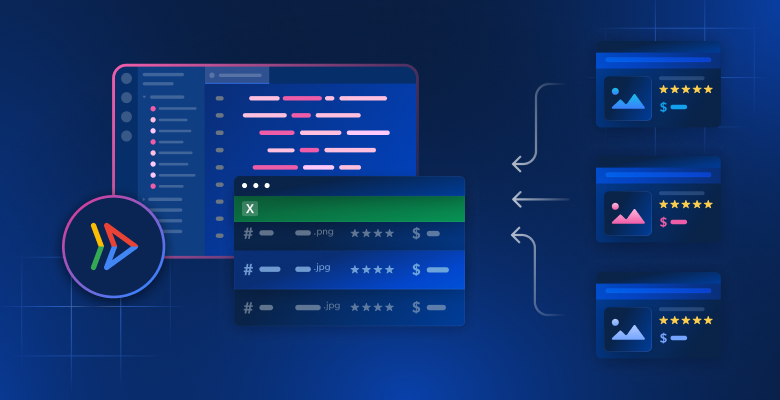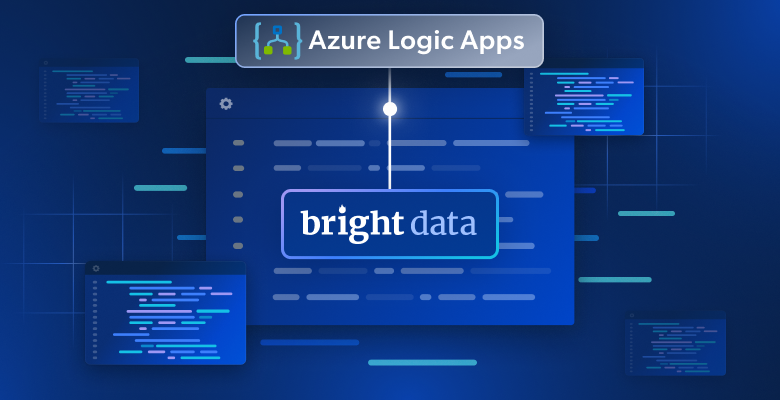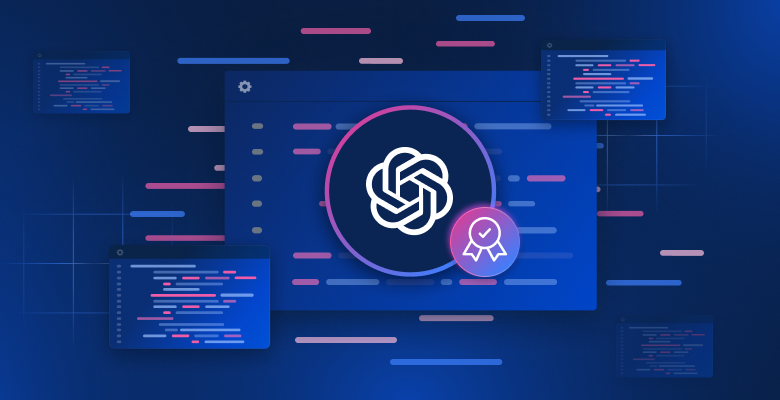In this guide, you will learn:
- What a Python web scraping library is
- Key factors to consider when comparing scraping libraries
- The top Python scraping libraries available
- A comparison table summarizing all the tools we analyzed
Let’s dive in!
What Is a Python Web Scraping Library?
A Python web scraping library is a tool designed to help extract data from online web pages. In detail, it supports one or all steps of the Python scraping process.
Python scraping libraries offer features for communicating with web servers, navigating the DOM, and interacting with web pages. Specifically, these libraries can send HTTP requests, parse HTML content, and/or render and execute JavaScript.
Popular categories of these libraries include HTTP clients, all-in-one frameworks, and headless browser tools. The first two are ideal for extracting data from static pages, while the latter is necessary for scraping dynamic websites.
Elements to Consider When Comparing Python Scraping Libraries
These are the key aspects to consider when comparing top Python web scraping libraries:
- Goal: The primary goal or intended use of the library.
- Features: Core functionalities and capabilities provided by the Python scraping tool.
- Category: The type of library (e.g., HTTP client, browser automation, etc.).
- GitHub stars: The number of stars the project has garnered on GitHub, reflecting community interest.
- Weekly downloads: The frequency of downloads on pip, indicating popularity and usage.
- Release frequency: How often updates or new versions of the library are released.
- Pros: Key benefits and strengths of using the library for web scraping.
- Cons: Potential limitations or disadvantages of the library.
Top 7 Python Libraries for Web Scraping
Discover the list of the best open-source JavaScript scraping libraries, selected and ranked based on the criteria outlined earlier.
For a comprehensive collection of tools, check out our Python scraping library GitHub repository.
1. Selenium

Selenium is a Python scraping library primarily used for browser automation. It gives you what you need to interact with web pages just like a human user would do. That makes it ideal for scraping dynamic content that requires JavaScript execution.
Selenium supports multiple browsers like Chrome, Firefox, Safari, and Edge form the same API. This exposes methods to click buttons, hover elements, filling forms, and more. The library also features options like headless browsing, custom waits, and executing JavaScript on the page.
Find out more in our tutorial on Selenium web scraping.
🎯 Goal: Provide a high-level API for automating browsers to perform tasks such as testing and web scraping via browser interaction
⚙️ Features:
- Support the interaction with many browsers, including Chrome, Firefox, Safari, and Edge
- Can run browsers in headless mode
- Can click, type, and perform other user actions on web elements
- Explicit and implicit waits for handling dynamic content and complex interactions
- Can capture screenshots of web pages or even single elements
- Support for proxy integration
- Can execute JavaScript code within the browser for custom web interactions directly on the page
- Powerful API to control browsers, handle sessions, and more
🧩 Category: Browser automation
⭐ GitHub stars: ~31.2k
📥 Weekly downloads: ~4.7M
🗓️ Release frequency: Around once a month
👍 Pros:
- The most popular browser automation tool in Python
- Tons of online tutorials, resources, how-tos, videos, etc
- One of the largest and most active
👎 Cons:
- Less feature-rich API compared to more modern tools like Playwright
- The explicit and implicit wait mechanism can lead to flaky logic
- Slower compared to similar tools
2. Requests

Requests is a library for making HTTP requests, a vital step in web scraping. Thanks to an intuitive and rich API, it simplifies sending HTTP requests and handling responses. In particular, it supports all HTTP methods (GET, POST, etc.) so that you can fetch content from web pages and APIs.
Requests can also manage cookies, customize headers, handle URL parameters, keep track of sessions and more. Since it does not feature HTML parsing capabilities, it is generally used with libraries like Beautiful Soup.
Follow out complete tutorial to master the Python Requests library.
🎯 Goal: Provide an intuitive APi for sending HTTP requests in Python
⚙️ Features:
- Support all HTTP methods
- Can reuse established connections for multiple requests to save resources
- Supports URLs with non-ASCII characters
- Support for proxy integration
- Can retains cookies across multiple requests
- Support JSON parsing on responses
- Ensures secure connections by validating SSL certificates
- Automatically decodes response content, such as gzip or deflate compression, to make it easier to work with raw data
- Built-in support for HTTP basic and digest authentication methods
- Provides a convenient way to manage cookies in a key/value format
- Enables downloading large files or data streams efficiently without storing everything in memory
- Support for
User-Agentspoofing
🧩 Category: HTTP client
⭐ GitHub stars: ~52.3k
📥 Weekly downloads: ~128.3M
🗓️ Release frequency: Every few months
👍 Pros:
- Simply the most popular HTTP client in Python
- Intuitive API
- Tons of online resources
👎 Cons:
- No support for TLS fingerprint spoofing
- Requires an HTML parser
- Slower compared to
aiohttporhttpx
3. Beautiful Soup

Beautiful Soup is a library to parse HTML and XML documents in Python, another key action it in web scraping. Once parsed, it allows you to navigate and maniuplate the DOM structure through an easy-to-learn API.
When it comes to data extractation, Beautiful Soup exposes a lot of methods for selecting HTML elements and read data like text, attributes, and more. The Python web scraping library supports different HTML parsers and can even handle poorly structured or malformed HTML.
Note that it cannot handle HTTP requests itself. So, it is usually integrated with like Requests as shown in our Beautiful Soup scraping tutorial.
🎯 Goal: Offer an efficient way to parse, navigate, and manipulate DOM structures generated from HTML and XML documents
⚙️ Features:
- Can parse both HTML and XML documents.
- Supports a variety of parsers like
lxml,html5lib, and the built-in Python HTML parser - Can find HTML elements by CSS selectors, XPath expressions, tag names, attributes, text content, and more
- Can parse even malformed or poorly structured HTML
- Offers a flexible API for searching and navigating complex HTML structures
- Provides methods to extract text, links, images, and other data from a webpage
🧩 Category: HTML parser
⭐ GitHub stars: —
📥 Weekly downloads: ~29M
🗓️ Release frequency: Every few months
👍 Pros:
- The most widely adopted HTML parser in Python
- Can integrate with different underlying HTTP parsing engines
- Tons of online tutorials
👎 Cons:
- Requires and HTTP client like Requests
- Outdated documentation
- Cannot be integrated with JavaScript engines
4. SeleniumBase

SeleniumBase is an enhanced version of Selenium, optimized for advanced web automation use cases. It simplifies browser automation with features like automatic browser setup, support for authenticated proxies, and methods to bypass anti-bot solutions.
It provides all the functionality of Selenium WebDriver, with additional capabilities. For example, it includes smart waiting for dynamic content and can handle anti-bot measures like CAPTCHAs.
🎯 Goal: Provide a professional toolkit for web automation activities for testing and scraping websites
⚙️ Features:
- Supports multiple browsers, tabs, iframes, and proxies in the same test
- Automatic smart-waiting improves reliability and prevents flaky logic
- Can run scripts through authenticated proxy servers
- Can run tests with a customized browser user agent
- Integrates with
selenium-wirefor inspecting browser requests - Can avoid anti-bot and anti-scraping detection systems via UC Mode and CDP Mode
- Can execute JavaScript code from Python calls
- Can pierce through Shadow DOM selector
- CAPTCHA-bypass capabilities
🧩 Category: Browser automation
⭐ GitHub stars: ~8.8k
📥 Weekly downloads: ~200k
🗓️ Release frequency: Around once a week
👍 Pros:
- Extended version of Selenium designed to overcome its limitations
- Includes specific features to bypass anti-bot solutions
- Automatic downloads for browsers and drivers
👎 Cons:
- Offers many features that may be unnecessary for just scraping
- When extracting data from child nodes, it is still subject to some Selenium limitations
- Requires numerous dependencies
5. curl_cffi

curl_cffi is an HTTP client based on cURL Impersonate, the project to mimicking the behavior of a browser while using cURL. It uses the TLS libraries and other configurations adopted by popular browsers to spoof TLS fingerprints.
That helps you bypass anti-scraping measures that rely on browser signatures. As it is based on asyncio, curl_cffi is also optimized for performance. Plus it supports HTTP/2 and WebSockets.
🎯 Goal: Make automated HTTP requests that appear as coming from a browser, but without using a browser
⚙️ Features:
- Supports for JA3/TLS and HTTP/2 fingerprint impersonation, including the latest browser versions and custom fingerprints
- Significantly faster than
requestsorhttpxand comparable toaiohttpandpycurl - Mimics the familiar requests AP
- Offers full
asynciosupport with built-in proxy rotation for each request - Includes support for HTTP/2, unlike
requests - Provides WebSocket support
🧩 Category: HTTP client
⭐ GitHub stars: ~2.8k stars
📥 Weekly downloads: ~310k
🗓️ Release frequency: Around once a week
👍 Pros:
- Can impersonate TLS signatures and JA3 fingerprints of multiple browsers
- Both
requests– andhttpx-like API and low-level cURL-like API - Feature-rich API that is more extensive of that of
requests
👎 Cons:
- Not many online tutorials and resources
- Not as popular as other Python HTTP clients
- No support for Firefox impersonification
6. Playwright

Playwright is a versatile headless browser library for automating web browsers. Its API is available in multiple languages, including Python. While the tool was originally developed in JavaScript, the Python API offers a feature set comparable to its JavaScript counterpart.
Playwright supports Chromium, WebKit, and Firefox browsers. Compared to Selenium, it is more modern and provides a wider range of feature. That makes it an excellent choice for advanced web automation. However, it is still less knwon within the Python web scraping community.
🎯 Goal: Offer a high-level API for multi-browser end-to-end automation in modern web apps
⚙️ Features:
- Cross-browser support for Chromium, WebKit, and Firefox
- Cross-platform testing on Windows, Linux, macOS, with headless and headed modes
- Automatic waiting for elements to become actionable
- Native mobile web emulation, including Google Chrome for Android and Mobile Safari
- Stealth mode integration using the Playwright Extra
- Support for multiple tabs, different origins, unique users, and isolated contexts within a single test
- Web-first assertions with automatic retries until conditions are satisfied
- Trusted events that simulate real user interactions for more reliable tests
- Comprehensive frame handling with Shadow DOM traversal capabilities
- Code generation by recording actions
- Dedicated tool for step-by-step debugging, selector generation, and detailed execution logs
🧩 Category: Browser automation
⭐ GitHub stars: ~12.2k
📥 Weekly downloads: ~1.2M
🗓️ Release frequency: Around once a month
👍 Pros:
- Compatibility with most browsers
- Offers advanced features, including an automatic selector generator
- One of the most comprehensive automation APIs
👎 Cons:
- Resource-intensive library, consuming significant disk space and memory
- Challenging to master due to a steep learning curve
- Depends on a separate browser installation
7. Scrapy

Scrapy is a all-in-one Python framework for web crawling and scraping. Compared to the other Python scraping libraries on the list, this tool is designed for large-scale data extraction tasks. It enables you to define spiders that seamlessly:
- Perform HTTP requests
- Parse HTML
- Manage crawling logic
- Handle data storage
Thanks to a middleware engine, it supports request throttling, retries, and proxy integration. Scrapy can also be extended via plugins and supports exporting data in multiple formats like JSON, CSV, and XML.
🎯 Goal: Provide a complete web crawling and scraping experience for Python
⚙️ Features:
- Built-in support for handling HTTP requests, HTML parsing, node selection, crawling logic, and more
- Support for middlewares to customize request and response handling
- Extensible architecture with custom spiders, pipelines, and extensions
- Support for proxy integration
- Support for automatic request throttling and retries
- Built-in mechanisms to handle cookies, sessions, user-agent rotation, and more
- Can export data in multiple formats (e.g., JSON, CSV, XML, etc.)
- Extendible via plugins
- Support for integration with browsers via Scrapy-Splash
- Comprehensive logging and debugging tools
🧩 Category: Scraping framework
⭐ GitHub stars: ~53.7k
📥 Weekly downloads: ~304k
🗓️ Release frequency: Every few months
👍 Pros:
- Automatic crawling capabilities
- Rich CLI commands
- All-in-one rich scraping and crawling API
👎 Cons:
- No built-in support for browser automation
- Complex to master and configure
- Can be memory- and CPU-intensive in large-scale scraping projects
Best Python Web Scraping Library
For a quick overview, see the summary table of Python web scraping libraries below:
| Library | Type | HTTP Requesting | HTML Parsing | JavaScript Rendering | Anti-detection | Learning Curve | GitHub Stars | Downloads |
|---|---|---|---|---|---|---|---|---|
| Selenium | Browser automation | ✔️ | ✔️ | ✔️ | ❌ | Medium | ~31.2k | ~4.7M |
| Requests | HTTP client | ✔️ | ❌ | ❌ | ❌ | Low | ~52.3k | ~128.3M |
| Beautiful Soup | HTML parser | ❌ | ✔️ | ❌ | ❌ | Low | — | ~29M |
| SeleniumBase | Browser automation | ✔️ | ✔️ | ✔️ | ✔️ | High | ~8.8k | ~200k |
| curl_cffi | HTTP client | ✔️ | ❌ | ❌ | ✔️ | Medium | ~2.8k | ~310k |
| Playwright | Browser automation | ✔️ | ✔️ | ✔️ | ❌ (but supported via the Stealth plugin) | High | ~12.2k | ~1.2M |
| Scrapy | Scraping framework | ✔️ | ✔️ | ❌ (but supported via the Scrapy-Splash plugin) | ❌ | High | ~53.7k | ~304k |
Conclusion
In this blog post, you explored some of the best Python scraping libraries and learned why they stand out. We compared popular HTTP clients, browser automation tools, and crawling libraries commonly used in the Python ecosystem.
These libraries are great for doing web scraping. Still, they come with limitations in handling certain challenges, such as:
- IP bans
- CAPTCHAs
- Advanced anti-bot solutions
- Easy deployment in the cloud
- Server maintenance
These are just a few examples of the hurdles scraping developers face daily. Forget about those issues with Bright Data solutions:
- Proxy Services: 4 types of proxies designed to bypass location restrictions, including 150 million+ residential IPs.
- Web Scraper APIs: Dedicated endpoints for extracting fresh, structured data from over 100 popular domains.
- Web Unlocker: API to manage site unlocking for you and extract a single URL.
- SERP API: API that manages unlocking for search engine result pages and extracts a single page.
- Scraping Browser: Selenium and Playwright-compatible browser with built-in unlocking features.
- Scraping Functions: A development environment to build JavaScript scrapers on Bright Data infrastructure, with integrated unlocking and browser support.
All of the above scraping tools, solutions, and services seamlessly integrate with Python—and any other programming language.
Create a Bright Data account and test these scraping services with a free trial!






